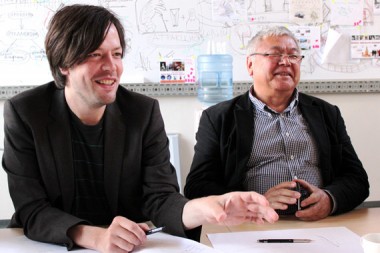Interview with Daniel van der Velden and Agata Jaworska
Last week the Russia consumes design team, led by Daniel van der Velden was in Moscow for research and initial concept development. Theory & Practice published an interview by Ksenia Petrova with Daniel and Droog project & content manager, Agata Jaworska today. Here is the extended English version.
Tell us, please, what is this project about and what was its premises?
Agata: The Droog Lab was initiated in 2009 in Amsterdam by Renny Ramakers, director and co-founder of Droog, mainly for two reasons. One is this fact that more and more cities all over the world are developing in the same direction and are starting to look the same, when in reality, one knows there are real differences between them. The other is, if you look at the world of design, designers are copying and referencing each other and the design world is becoming circular and inward-looking. The Lab was started to bring designers to foreign places to find new directions for design. We will be working on eight projects over the course of four years.
Daniel: The initial idea of ‘Russia Consumes’ came from two observations that Renny Ramakers had. One was about the extreme, ‘hyperconsumption’ – diamonds, ‘bling-bling’, etcetera. The other was about peasants reading classic literature on the train. We think that these two forms of consuming might be connected – either by their extreme difference, or by the fact that they exist as part of a similar mindset or mentality. So, what we’ve been doing here this week is visiting different places, interviewing people, researching, observing and of course participating as far as we can in everyday Moscow life – and observing that through a design lens, a design point of view. What we have found is going to be translated into a design concept which can be an idea, an image, a prototype or a product. The concept will not be about Moscow but it will be informed by it.
Agata, you said, that there is a series of similar projects by Droog?
Agata: The first project was in Dubai, the second is in the Canadian Arctic, the third one is in New York, and Moscow is the fourth. There will be four more and each of them will have an exhibition and a publication.
What is the role of Strelka Institute for Media, Architecture and Design?
What kind of outcome you are expecting from this project?
Daniel: I’m expecting that we deliver something that works on two levels; one is a level of fantasy, of fiction, or fairytale – design providing an escape route for the mind. But on the other, lower level it should be about absolutely basic elements of life, about survival in a world that is so pretty and yet so hostile. At this point I also would like to mention our team, consisting of the architect Totan Kuzambaev, graphic designer Pavel Milyakov, graphic designer Michèle Champagne and product designer Digna Kosse. Together with Agata we’ve had such a great week – and I do hope this will show off in the final result. As said before, it is going to be something conceptual as you would maybe expect from Droog.
Agata: It’s very important to note that we’re not designing for the place, even though we are working with people from here, but rather, we are learning from the place as an inspiration for a broader result.
What did you learn so far here, in Russia?
Daniel: The thing that I found very interesting about Russia as far as I’ve seen it is this vibrant and dynamic society, which coexists with institutions and government in a fascinating manner. Because there often seems to be no positive interaction at all – the government does its own things, people do their own things. You have this body of institutions that is almost like a ruin, or museum piece, and on top of that there is all that social energy. We’ve been to luxury villages and exclusive spas and shopping malls, and to a soup-kitchen. We’ve been to people’s houses, to the high-rise in the periphery, and to grey and black markets where they sold things from Chinese imports to machetes to live owls and raccoons. Impressive.
Agata: I think the biggest lesson we learned from Russia is how it is incredibly advanced in some ways but also backwards at the same time. The way people cope, and at times thrive, is a model that countries in the West dealing with uncertain times can learn from.
And the last question is about Russian soul, of course. There are lots of speculations about this ‘mystical’ thing. Do you have something to say about it based on your experience of Russia?
Daniel: You can keep talking about it, you may approach it – but you can never quite grasp it. I found here, in Russia, a deep and sometimes black humor. No conversation has passed without at least five jokes and anecdotes. This coexistence of optimism and cynicism is very interesting and it does have the literary quality that Renny pointed at in the very beginning of this project. I would say that we don’t see this in the West and I wouldn’t say I understand it yet – I’m not sure if I ever can. I’m thankful for this week, and invite you to look at the outcomes in May 2011.

